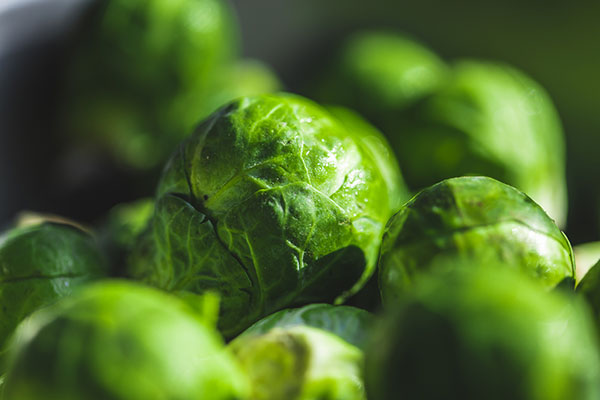What is your favourite part of Christmas dinner? Is it the free-range turkey? The vegan pigs in blankets? The organic parsnips? One thing for sure, I bet it’s not the Brussel sprouts.
Since our school days, when Brussel sprouts came overboiled to the point of going grey, wafting that familiar sulphurous smell, many of us have dreaded eating the cruciferous vegetable. Yet sprouts are the perfect Christmas green, with something to teach us all about festive healthy eating and food waste.
As a hardy brassica, the crop grew (and still grows) well in our winter climate and is even said to sweeten after a frost. Today, it is one of the largest horticultural crops grown in the UK: you can spot fields of them down the east coast, from Aberdeenshire to Kent and in the West Country.
It is possible to buy British sprouts from September to March and it is certainly a low carbon way to get your five-a-day.
In fact, as a seasonal, affordable and plentiful crop, it should really be a symbol of the kind of vegetables we should be all be eating more of.

Like all veggies, they’re low in calories, fat, and salt and high in fibre. Brussel sprouts contain vitamins C, A and B6, as well as the important vitamin K, which promotes strong bones. New varieties mean Brussel sprouts taste slightly milder and sweeter, and adventurous recipes even suggest putting sprouts in salads and even smoothies.
Slowly, we are growing out of our sprout-phobia. But there is one more element that needs to be highlighted before crowning sprouts the most ethical food for Christmas, and that is food waste.
In the home, this is tackled by storage (try keeping sprouts in the fridge to make them last longer), re-use (Boxing Day bubble and squeak anyone?) and recycling (compost or food waste bin).
But perhaps the biggest win for saving food waste is before the sprouts reach your home. For crops like Brussel sprouts, a huge amount is produced (and wasted) if they do not meet supermarkets’ high standards, or if consumer demand changes.
In the past, these perfectly good vegetables were ploughed back into the ground or even sent to landfill. But thanks to charities, they are now redistributed to those in need.
FareShare, the UK’s biggest food waste charity, intercepts edible food that would otherwise be wasted because it is ‘wonky’, close to the sell by date or rejected by the supermarkets, and redistributes it to local charities. Since the coronavirus outbreak began, it has doubled the amount of food redistributed to two million meals a week.
One such local charity is Edinburgh-based Empty Kitchens, Full Hearts, where roasted sprouts were recently included in meal kits sent out to some of the 1,000 people helped by the charity every day.
The charity has grown from a standing start at the beginning of the pandemic to providing more than one million meals, and the team has highlighted the demand not just for food, but wholesome fresh fruit and vegetables.
In recent years, FareShare has been able to save even more fresh fruit and veg thanks to a scheme, initially funded by the government, which paid for farmers to pack and distribute their surplus produce.
But the government failed to renew the funding in this year’s budget and FareShare is now campaigning to help plug the shortfall, pointing out that 92 per cent of beneficiaries say the food they receive helps them stay healthy. For 29 per cent of their clients, it’s the only time they eat fruit and veg.
At the root of this is a broken food system. Because of the oligopoly of a small number of supermarkets, farmers have little choice but to overproduce to meet tight specifications. Many councils have yet to introduce efficient food waste recycling systems. Families struggling to eat often find junk food is cheaper than fresh fruit and veg. The work of untangling it all and shifting to a more fair and sustainable food system has begun with the National Food Strategy, and some more sustainable retailers, but there is a long way to go.
In an ideal world, food would not be wasted and people would not go hungry. But while 8.4 million are hungry in the UK, FareShare provides a way of ensuring food is redirected to a good cause.
This year, instead of pushing Brussel sprouts to one side on our Christmas dinner plate, perhaps we should remember how lucky we are?
Comment below with your favourite sprout recipe.












Just one more example of the crazy food industry. More power to FareShare and its lessons to all of us.
Favourite Sprout recipe: thinly sliced and briefly fried in bacon fat.
FareShare admit that they would rather not be there, but while there are hungry people why not use good food?
I use my sprouts to make sauerkraut…they are an absolute ideal and rather cute replacement for regular cabbage. Nowt different in the prep process…just massage in the weight ratio equivalent of salt as per traditional sauerkraut
Try coleslaw with finely sliced sprouts, leeks and grated carrots.
Ooh really! All raw?? Will try…. sounds nice and simple.
I’ve never made sauerkraut but maybe when I finally get round to it, I will use sprouts!
Who cares if your veg is wonky, I certainly don’t, if supermarkets sold wonky veg at reduced prices,(I know some do), then fresh veg would be available to more people, instead of wasting it. As for me, one of my favourite parts of Christmas is the fabulous Bubble and Squeak on Boxing Day., has to have Sprouts in it I deliberately cook more veg than we could possibly eat and have a delicious easy lunch on Boxing Day. YUM!
Yes, I love bubble and squeak! Makes me wonder why we don’t do it all year round…
I do, after every Sunday roast.